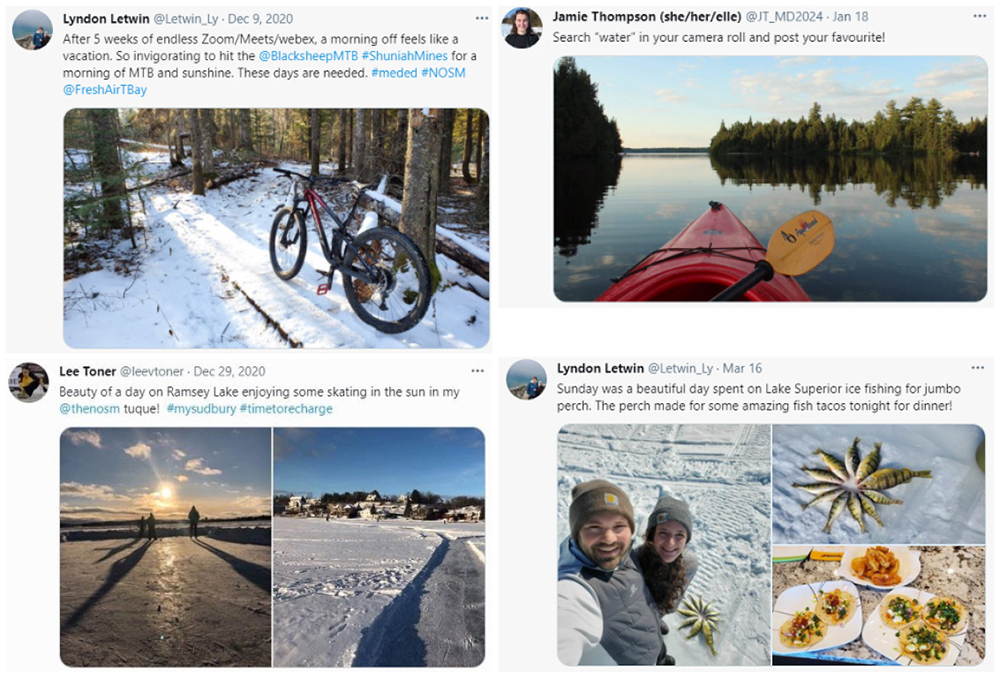What wellness looks like in the North

The Northern Ontario School of Medicine is prioritizing personal wellness—including the benefits of time spent in nature—in an effort to impact change across the wider culture of medicine, starting early with medical students and residents. It comes at a time when evidence-based studies on the benefits of nature are, for the first time, being prescribed to patients across Ontario.
“Forming lasting healthy habits that start during medical education and role modelling those habits amongst peers in the medical profession and to our patients is formative. For example, recognizing the personal benefits you feel after a hike on a trail or a swim in the lake is actually a remedy to combat stress, anxiety and burnout,” says Dr. Lee Toner, NOSM Interim Associate Dean, Undergraduate Medical Education.
In a recent Northern Routes blog, Dr. Sarita Verma, NOSM’s Dean, President and CEO, encouraged everyone in the School community to take a breath and consider the gifts of the natural world outside. “The next time you find yourself outside, inhale deeply. There is almost no pollution in the air this winter. The crisp, clean air is the equivalent to winning the lottery. It’s a great feeling.”
Lyndon Letwin, second-year NOSM medical student, says he feels relaxed, satisfied, accomplished, reconnected, and refocused after spending time in nature. “I find it does make me a better student. The online learning environment has made it more difficult to concentrate when I have pent up energy, so any outing greatly aids in my ability to maintain a calm mind, focused work ethic, and elevated mood.”
First-year NOSM medical student, Jamie Thompson, is a Métis, French-speaking student from Manitouwadge who is active outdoors and enjoys sharing social media posts about her adventures. She says the experience refreshes her body and mind. “A long day of camping or hiking always improves my wellness significantly. There’s something about being outside, unconnected, without distractions, that really gets rid of my background thoughts, worries, and brain fog.”
She is one of an up-and-coming generation of future physicians who have experienced an intense shift into online learning during the COVID-19 pandemic. Time outdoors is helping all NOSM learners endure long hours of online study.
“I definitely recommend getting outside for anyone because we need to take breaks,” says Jamie. “This is especially true in a COVID-19 world, where all of our social, education, and work life is on screens. Even just to get out and do a quick walk around your neighborhood, getting the blood pumping, some vitamin D, and those endorphins can help both your body and your mind when you get back to the tasks at hand.”
The hope is that in this new culture of medicine—where breaks are designed to improve performance and mental health—will become more professionally acceptable and encouraged in an environment where residents continue to endure 24-hour shifts and overnight study sessions. And it’s not limited to time in nature. Ways of feeling better could include exercise, activities, hobbies or interests that help individuals or learners feel renewed or refreshed. In addition to being outdoors, Jamie also enjoys traditional beadwork.
“I think it’s really important to take that time for wellness in its variety of forms in medical school, and I would certainly say it’s becoming more accepted,” says Jamie.

Read more on this topic:
- Ontario doctors set to turn over a new leaf with program that lets them prescribe ‘nature’ to ailing patients
- Visit the PaRx website: People who spend at least two hours in nature each week report significantly better health and wellbeing.
- B.C. Doctors are now prescribing nature to boost patient health; The parks prescription program is the first of its kind in Canada.
